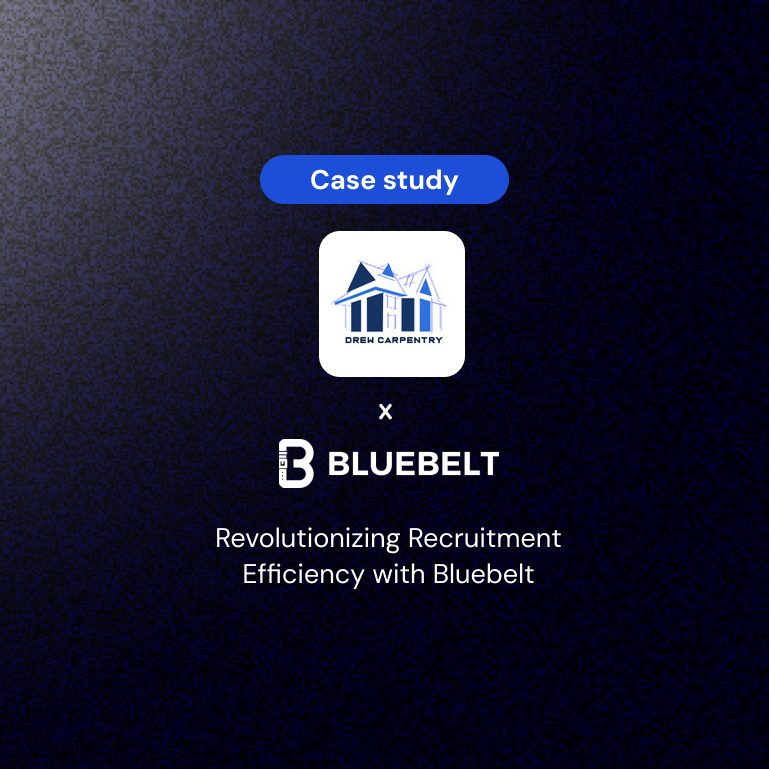
Why Relying on "Gut Feel" in Hiring is a Bad Idea


Why Relying on "Gut Feel" in Hiring is a Bad Idea: The Importance of Qualitative Assessment
In the fast-paced world of recruitment, especially in heavy industries like construction and manufacturing, hiring managers often face immense pressure to fill positions quickly. This urgency can sometimes lead to decisions based on "gut feel" rather than a thorough, qualitative assessment of candidates. While intuition can play a role in decision-making, relying solely on gut feel can introduce significant biases and result in suboptimal hiring choices. In this blog, we'll explore why gut feel is a flawed approach and how qualitative assessment, powered by tools like Bluebelt, can lead to better hiring outcomes.
The Pitfalls of Gut Feel in Hiring
1.
Gut feel is inherently subjective and can be influenced by unconscious biases. These biases can stem from personal experiences, stereotypes, or even fleeting impressions. When hiring decisions are based on gut feel, there's a risk of favoring candidates who may not be the best fit for the role but simply resonate more with the interviewer on a personal level.
2.
Relying on gut feel can lead to inconsistent hiring practices. Different hiring managers may have different intuitions and biases, resulting in a lack of standardization in the recruitment process. This inconsistency can make it challenging to ensure that all candidates are evaluated fairly and objectively.
3.
Gut feel often focuses on superficial traits rather than a candidate's actual skills and competencies. This can lead to overlooking candidates who may not make an immediate strong impression but possess the necessary qualifications and potential to excel in the role.
4.
Biases influenced by gut feel can negatively impact diversity in the workplace. When hiring decisions are based on intuition, there's a tendency to favor candidates who are similar to the existing team, leading to a lack of diversity in terms of background, experience, and perspectives.
The Power of Qualitative Assessment
Qualitative assessment involves a structured and comprehensive evaluation of candidates based on objective criteria. This approach helps eliminate biases and ensures that hiring decisions are based on a candidate's true potential and fit for the role. Here's how qualitative assessment can transform the hiring process:
1.
Structured interviews involve asking all candidates the same set of questions, ensuring consistency and fairness. This approach allows hiring managers to compare candidates objectively and reduces the influence of personal biases.
2.
Behavioral and situational questions focus on a candidate's past experiences and how they would handle specific scenarios. These questions provide valuable insights into a candidate's problem-solving abilities, interpersonal skills, and cultural fit.
3.
Skills assessments are practical tests that evaluate a candidate's proficiency in specific areas relevant to the job. These assessments provide concrete evidence of a candidate's abilities and help identify the best fit for the role.
4.
Reference checks involve contacting a candidate's previous employers or colleagues to gather feedback on their performance and work ethic. This step adds an additional layer of validation to the hiring process.
5.
AI-powered tools, like those offered by Bluebelt, can enhance qualitative assessment by providing data-driven insights. These tools use advanced algorithms to analyze candidate responses, generate job-fit scores, and predict future performance.
How Bluebelt Enhances Qualitative Assessment
Bluebelt is a cutting-edge tool designed to revolutionize the recruitment process in heavy industries. By leveraging AI and qualitative assessment techniques, Bluebelt helps companies make informed and unbiased hiring decisions. Here's how:
1.
Bluebelt's AI phone screens conduct initial interviews using natural language processing (NLP). These screens assess candidate responses objectively, providing a comprehensive analysis of their suitability for the role.
2.
Bluebelt generates job-fit scores based on a range of criteria, including skills, experience, and cultural fit. These scores offer a holistic view of each candidate, helping employers make data-driven decisions.
3.
Bluebelt's AI-powered resume screening quickly identifies the most qualified candidates, ensuring that no potential talent is overlooked. This automated process saves time and reduces the risk of bias.
4.
Bluebelt uses predictive analytics to forecast a candidate's future performance and retention. By analyzing historical data and identifying patterns, Bluebelt provides valuable insights into which candidates are likely to succeed in the long term.
5.
Bluebelt's AI-driven approach minimizes human bias by focusing on objective criteria. This promotes a more diverse and inclusive hiring process, ensuring that the best candidates are selected based on their qualifications and potential.
Conclusion
Relying on gut feel in hiring is a risky approach that can lead to biased and inconsistent decisions. In contrast, qualitative assessment offers a structured and objective way to evaluate candidates, ensuring that hiring decisions are based on merit and potential. By leveraging AI-powered tools like Bluebelt, companies in heavy industries can enhance their recruitment process, reduce bias, and make better hiring decisions. Embracing qualitative assessment is not just a best practice – it's a critical step towards building a skilled, diverse, and high-performing workforce.
